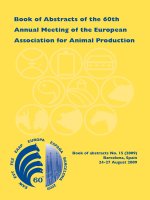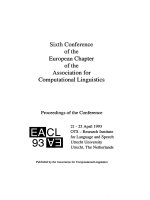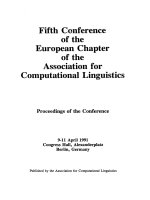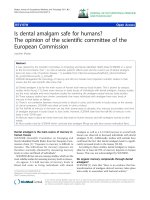13th Congress of the European Society for Evolutionary Biology
Bạn đang xem bản rút gọn của tài liệu. Xem và tải ngay bản đầy đủ của tài liệu tại đây (1.2 MB, 2 trang )
JAMES RENNIE BEQUEST
REPORT ON EXPEDITION/PROJECT/CONFERENCE
Expedition/Project/
Conference Title:
13th Congress of the European Society for Evolutionary Biology
Travel Dates:
20th-25th August 2011
Location:
Tübingen University, Germany
Group member(s):
Marisa Magennis
1) To present a poster of my PhD research entitled ‘Life cycle
choices: lag phase evolution in stochastic environments’ to 5 invited
scientists who are leaders in the field of experimental evolution and
to other interested delegates.
2) To attend conference talks and poster presentations.
Aims:
3) To network with delegates to gain ideas for improving my PhD
research project and to make contacts for future employment and/or
collaborations.
OUTCOME (not less than 300 words):After receiving a generous travel fund award from the James Rennie Bequest, I attended the
biennial meeting of the European Society for Evolutionary Biology (ESEB) at the 13 th
congress which took place in Tübingen, Germany from 20-25th August 2011. This is one of
the largest European conferences in evolutionary biology and was attended by 1300
delegates from the international community and was composed of 350 oral presentations
and almost 700 poster presentations.
The congress provided me with the opportunity to attend a wide range of scientific talks,
some of which were of general interest to me, and others which were directly relevant to my
PhD work. The mornings consisted of plenary sessions with high profile talks of a general
nature which provoked much debate, such as Michael Ruse from Florida State University
with a talk about whether history and philosophy of science can be useful to scientists and
Johannes Krause from the University of Tübingen who talked about sequencing the hominin
genome. There were then 6/9 parallel specialist symposia sessions. The symposium most
relevant to my PhD work was ‘Microbe/macrobe experimental evolution’ and this was a great
opportunity to listen to and afterwards meet with many of the scientists whose work I have
studied.
On three of the evenings there were ‘Regular Poster Sessions’. I presented my poster
entitled ‘Life cycle choices: lag phase evolution in stochastic environments’ at the first of
these sessions and my poster was displayed for the entire duration of the congress. The
congress implemented various activities aimed directly at helping PhD students to gain
exposure of their work. The most useful activity was the opportunity to invite five scientists of
my own choosing to attend my poster session. The scientists I invited included Richard
Lenksi, Michael Brockhurst, Rowan Barrett and Santiago Elena. These are all senior
scientists in the field of experimental evolution and provided me with excellent feedback on
my poster and on my current PhD research. I gained confidence from this session and made
contacts which may prove useful for job hunting and establishing collaborations. Without this
activity I may not have had the opportunity to speak to so many of these people at my
poster. Other delegates also attended my poster session and through these interactions I
gained insights into work which is taking place at other institutions, some of which
complemented my research and provided me with some ideas for future work.
Page 1 of 2
JAMES RENNIE BEQUEST
Another valuable activity organised for PhD students was ‘Meet a silverback’, which was
designed to facilitate communication between junior and senior scientists. Groups of 4/5
students selected a senior scientist to have dinner with and this event was kindly sponsored
by the Volkswagen Foundation. I was lucky enough to enjoy an evening with Hopi Hoekstra
from Harvard University and 4 other postgraduate students from various institutions. This
evening was enjoyable on a personal and professional level.
Tübingen is a beautiful town and the congress arranged various social activities within the
town. I took the opportunity to go on a walking tour of Tübingen and I was not disappointed.
This town has a rich and interesting history and the buildings and surroundings have been
renewed and restored. Our guide was excellent and told us about the many famous
residents and scholars of Tübingen, including the neurologist Alois Alzheimer, the
mathematician and astronomer Johannes Kepler, and Friedrich Miescher who was the first
to isolate and identify DNA in the laboratory which is now part of Tübingen Castle.
One of the most useful evening sessions was ‘Meet the Wiley-Blackwell Journal Editors at
ESEB’. Wiley-Blackwell publishes journals such as Nature, Science and Journal of
Evolutionary Biology and organised this session for those early stage researchers preparing
to submit their first manuscript. Editors from various journals answered any questions
regarding the publishing process and provided me with useful advice, particularly as I am
now preparing my first manuscript of my PhD work.
This congress took place at an ideal time for my PhD work as I have still time left to make
changes to my experimental approach and/or start new work. This experience also helped
me to focus on what I may want to work on in my post-PhD life.
I would like to express my sincere gratitude to the James Rennie Bequest for the travel
award which enabled me to attend this excellent conference.
The beautiful town of Tübingen with its lovingly restored buildings and punting along the Neckar River.
Page 2 of 2









